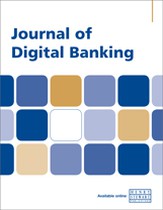Hyper-personalisation: Inducing behaviours through data — how machine learning and automation can help customers make valuable and informed decisions
Abstract
While personalisation is not an entirely new topic, there is currently massive hype around it. This is because service providers realise that they need to be more cost-effective in engaging with their customers, and also because customers now demand to be treated individually and in a personalised way. Several market trends have been adopted in recent years, bringing service providers to the level where they currently stand. The previous trends were both beneficial and applicable in a particular context; however, today, new approaches are required for service providers to progress, improve and move to the next level. Achieving a hyper degree of personalisation can be challenging — it requires investment, time and the right strategy. Furthermore, it is not a straightforward path, and it is essential to understand the business and technical challenges that service providers must address and overcome to succeed — challenges for which hyper-personalisation is the answer. This paper explores the concept of hyper-personalisation and its potential to induce customer behaviour through datadriven insights. It highlights the importance of knowing customers and leveraging their preferences and habits to deliver valuable and informed decisions. The financial services industry has the significant advantage of having access to a huge installed customer base and its data. In general, it is not a problem of lack of data that these industries face but rather one of how to derive actionable insights from it. The hyper-personalisation approach is bridging data with cognitive and digital capabilities to deliver unique, in-context and highly relevant experiences. With hyper-personalisation, service providers can scale up the personalisation leveraged by artificial intelligence (AI) and machine learning (ML) to deliver experiences and recommendations in real time to individuals, creating a true one-to-one personalisation.
The full article is available to subscribers to the journal.
Author's Biography
Luís Coelho is a senior manager at Celfocus Offer Development & Innovation team. He has many years of experience in IT project delivery and pre-sales activities for Telco and financial services industries gathered through more than 20 years of real-life and hands-on practice delivering mission-critical solutions. Currently, Luís is the Head of Hyper-Personalisation Offer, focusing on business and technical solutions to extract value from data for successful digital enablement by bridging data, cognitive and digital capabilities to deliver unique and highly relevant experiences to individuals, allowing service providers to reach customers more efficiently. Luís is passionate about the topic and strongly believes that one of the differentiators of his work is his capability of bridging business and technology bringing a unique combination of business knowledge insights and technology expertise that is leveraged by a human-centric design approach. He holds a master’s degree in computer science engineering from Lisbon Technical University and several Agile, Project Management and technical certifications.
Gonçalo Cachola is a manager at Celfocus Data & Analytics Value Stream. He spent his career conceiving and delivering high-value transformative data solutions with a track record in Telco and insurance industries. Currently, Gonçalo leads the Offer Development activities for data and analytics solutions focusing on creating next-generation analytics platforms to provide relevant insights and recommendations, covering both analytical and operational use cases. Gonçalo is passionate about analysing and defining how businesses can operate, engage and support their customers using datadriven approaches. He has in-depth knowledge and experience in data engineering, data visualisation and marketing automation technologies. He has a master’s degree in biomedical engineering and a postgraduate degree in digital marketing & analytics.
